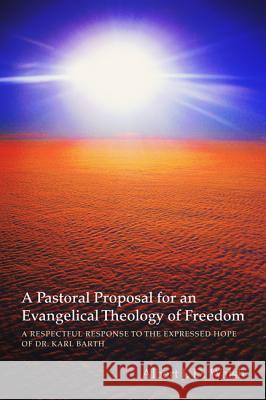A Pastoral Proposal for an Evangelical Theology of Freedom » książka
A Pastoral Proposal for an Evangelical Theology of Freedom
ISBN-13: 9781620326497 / Angielski / Miękka / 2013 / 144 str.
A Pastoral Proposal for an Evangelical Theology of Freedom
ISBN-13: 9781620326497 / Angielski / Miękka / 2013 / 144 str.
(netto: 83,26 VAT: 5%)
Najniższa cena z 30 dni: 87,18
ok. 16-18 dni roboczych
Dostawa w 2026 r.
Darmowa dostawa!
Description: The role of the Torah is poorly understood within the religious communities of both Judaism and Christianity, but with varying causes. Its use in biblical salvation history is much more than the foundational text for Israelite existence, covenant, and stipulation. ""Torah"" is the Hebrew word for instruction, not law, and this sacred document contains, not only the well-known Abrahamic covenant of grace, but two core lessons: the serious nature of sin and the fearful necessity of transforming grace. Torah of Sin and Grace provides a fresh, honest, and careful examination of both the Torah and the relevant prophetic portions of the later Hebrew Bible, which will reveal the fact that the biblical writers themselves had a larger understanding of the role of the Torah, and that this understanding always incorporated the recognition of the failed Israelite covenant, resulting in the core lessons concerning the sinfulness of man and the supernatural grace that rescues him. Much of the book discusses the unfolding of this glorious rescuing grace for both Jew and Gentile, including the ""new things"" revealed by the prophets such as the new covenant, the Suffering Servant, the ingathering of the Gentiles, and the future of Israel and their land. About the Contributor(s): Michael Tupek is a self-taught lay theologian, having studied biblical theology, biblical Hebrew and Greek, Jewish studies, philosophy, and history. He resides in New Hampshire with his wife, and works as an IT technician, and is also a professional artist.
Description:In concluding the series of lectures given while he made his first and only visit to the U.S., Dr. Karl Barth expressed his hope to see a theology of freedom for humanity originating from the U.S. As a respectful response to the expressed hope of Karl Barth, Albert Walsh presents this essay as a pastoral proposal on the subject of freedom from the point of view of the Judeo-Christian tradition. Walsh presents both biblical and theological foundations for a theology of freedom, which he calls ""graced-freedom,"" contending that this is that transcendent freedom that God alone confers and sustains as a freedom for humanity.Endorsements:""Freedom is a cherished value, yet it is often misunderstood within Christian circles. In this essay, Walsh provides a thoughtful and accessible study for layman and pastor alike. Through surveying biblical texts, he qualifies freedom, defining it as graced freedom in relation to the lordship of Christ. He then provides challenging pastoral applications in the context of ecumenicity. This is a thought-provoking essay on freedom.""--H. Drake Williams, III, Academic Dean and Professor of New Testament, Tyndale Theological Seminary""Walshs reflections, motivated by suggestions by Karl Barth, serve as an antidote to the churchs tendency to mimic the environing societys identification of freedom with the expansion of opportunities for self-assertion. Against this view Walsh reminds us that genuine Christian freedom is the ontological gift of participation in Christs act of reconciliation, and the enactment of service that issues from this gift.""--Lee Barrett, Professor of Systematic Theology, Lancaster Theological SeminaryAbout the Contributor(s):Albert J. D. Walsh is Pastor of Heidelberg United Church of Christ, Hatfield, Pennsylvania, where he has served since 1999. His previous works include United and Uniting and The Eucharists Biographer.











